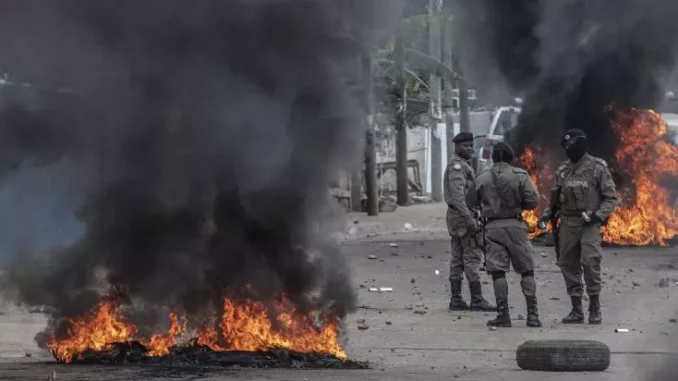
On Monday morning, October 21, Mozambican police forcefully suppressed a demonstration in central Maputo. The protest followed a call from opposition leader and presidential candidate Venancio Mondlane for a general strike to denounce electoral fraud.
Tensions had escalated after the murder of two of Mondlane’s close associates on Saturday October 19. Despite the ban on protests, Police fired tear gas at Mondlane’s campaign headquarters in an attempt to disperse the demonstrators.
Speaking to reporters outside his headquarters, Mondlane condemned the police action: “If citizens cannot exercise their rights, it’s worse than a state of war,” he said. He went further, accusing the authorities: “They are the real terrorists.” His remarks were abruptly cut short as tear gas was deployed near him, forcing him to pause his address.
Throughout the morning, police sealed off downtown Maputo, preventing any form of public gathering. According to True Democracy, a civil society group, officers used rubber bullets and tear gas against protesters. Mondlane later expressed his frustration in a Facebook video, denouncing the violence: “This is real terrorism—shooting at defenseless young people.”
As the country awaits the final results of the general elections, the opposition has already rejected the provisional results announced by the Electoral Commission, which declared Daniel Chapo, the candidate of the ruling Frelimo party, the winner. The recent assassinations of Mondlane’s lawyer and a key political ally have further inflamed tensions. Their funerals are scheduled for Tuesday, October 22.
International organizations have voiced concern. The European Union expressed alarm over the “violent dispersal” of the demonstration, while the United Nations called for calm and restraint from all parties. The African Union also voiced deep concern over the rising violence, particularly the recent killings. Portugal’s Foreign Minister, Paul Rangel, emphasized the importance of a fair electoral process, stressing that it is crucial for the country to ensure legitimate authorities emerge from this period of unrest.
